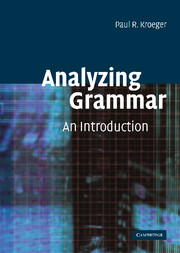Book contents
- Frontmatter
- Contents
- Preface and acknowledgments
- List of abbreviations
- 1 Grammatical form
- 2 Analyzing word structure
- 3 Constituent structure
- 4 Semantic roles and Grammatical Relations
- 5 Lexical entries and well-formed clauses
- 6 Noun Phrases
- 7 Case and agreement
- 8 Noun classes and pronouns
- 9 Tense, Aspect, and Modality
- 10 Non-verbal predicates
- 11 Special sentence types
- 12 Subordinate clauses
- 13 Derivational morphology
- 14 Valence-changing morphology
- 15 Allomorphy
- 16 Non-linear morphology
- 17 Clitics
- Appendix: Swahili data for grammar sketch
- Glossary
- Reference
- Language index
- Subject index
11 - Special sentence types
Published online by Cambridge University Press: 05 June 2012
- Frontmatter
- Contents
- Preface and acknowledgments
- List of abbreviations
- 1 Grammatical form
- 2 Analyzing word structure
- 3 Constituent structure
- 4 Semantic roles and Grammatical Relations
- 5 Lexical entries and well-formed clauses
- 6 Noun Phrases
- 7 Case and agreement
- 8 Noun classes and pronouns
- 9 Tense, Aspect, and Modality
- 10 Non-verbal predicates
- 11 Special sentence types
- 12 Subordinate clauses
- 13 Derivational morphology
- 14 Valence-changing morphology
- 15 Allomorphy
- 16 Non-linear morphology
- 17 Clitics
- Appendix: Swahili data for grammar sketch
- Glossary
- Reference
- Language index
- Subject index
Summary
Speakers can use their language to perform various kinds of actions: making statements, asking questions, giving commands, offering wishes, blessings, curses; performing rituals and ceremonies (e.g. weddings), pardoning or sentencing a criminal, opening or closing a meeting, etc. Actions of this sort are often referred to as speech acts. The first three of these (statements, questions, and commands) are the most common. People of all cultures need to perform these actions, and in most (if not all) languages we find distinct sentence patterns corresponding to each of them.
In chapter 4 we suggested that the most basic kind of sentence structure is a simple statement, i.e. a declarative clause. In this chapter we will discuss questions, commands, and various other “non-basic” sentence patterns, focusing primarily on their grammatical structure rather than their pragmatic functions. Different languages use different combinations of morphological, syntactic, and phonological devices for marking sentence type, but certain patterns of similarity can be observed across languages, as we will see. Since we take the declarative to be the most basic sentence type, we will focus on those features which distinguish the other types from a basic declarative clause. We will begin with some brief comments about speech acts.
Direct vs. indirect speech acts
As we noted above, the three most common things that speakers do by speaking are: (i) making statements (asserting or denying the truth of a proposition); (ii) asking questions (questioning the truth of a proposition, or asking for additional information about a proposition); and (iii) giving commands.
- Type
- Chapter
- Information
- Analyzing GrammarAn Introduction, pp. 196 - 217Publisher: Cambridge University PressPrint publication year: 2005



